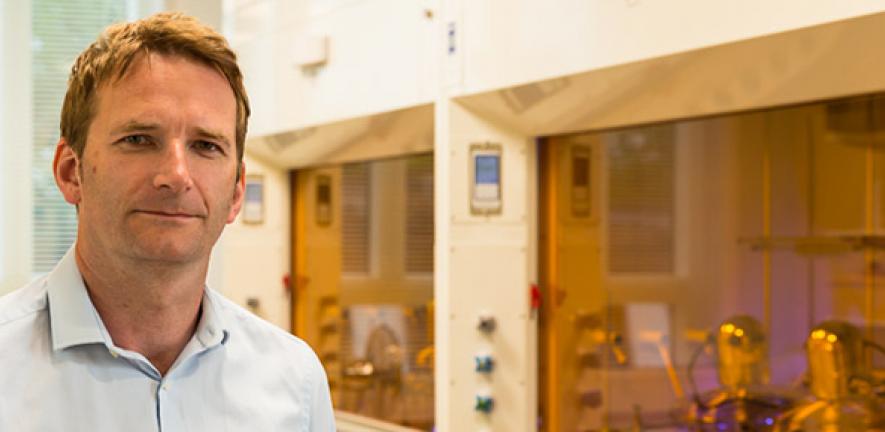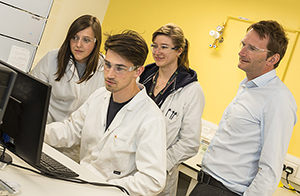
He took up the post on 1 July 2019, succeeding previous incumbent Professor Steve Ley.
A Professor of Chemistry at Cambridge, Matt’s research focuses on inventing new ways to stimulate organic molecules to react by using catalysts. In this way, he and his research group have found many new and better methods for making complex small molecules that are important in areas such as drug discovery, and have developed strategies that enable the chemical modification of biomacromolecules – such as peptides and proteins – that provide new tools for chemical biologists.
"Matt Gaunt is one of the most creative synthetic organic chemists in the world. He is richly deserving of being named the new Yusuf Hamied 1702 Professor of Chemistry at Cambridge."
Faster access to new pharmaceutical candidates
His group is also interested in exploring how new technological advances, such as high-throughput experimentation platforms, can accelerate chemical synthesis to provide scientists with faster access to molecules such as new pharmaceutical candidates.
 In recognition of this work, Matt was awarded the 2019 Synthetic Organic Chemistry Award by the Royal Society of Chemistry. He previously received the Society’s Corday-Morgan Medal in 2013, and the American Chemical Society Cope Scholar Award in 2016.
In recognition of this work, Matt was awarded the 2019 Synthetic Organic Chemistry Award by the Royal Society of Chemistry. He previously received the Society’s Corday-Morgan Medal in 2013, and the American Chemical Society Cope Scholar Award in 2016.
Professor Steve Ley says: "I am delighted that Matt Gaunt has been appointed as my successor to the 1702 chair of Organic Chemistry: in so doing he becomes the 16th incumbent to this important position for Cambridge and indeed the UK. Matt is a wonderfully creative scientist and I wish him every success for the future."
The Yusuf Hamied 1702 Chair of Chemistry – recently renamed after Dr Yusuf Hamied, an eminent alumnus whose generous donation supports the chair – has an extremely long and distinguished history.
One of the oldest Chairs of Chemistry in the UK
Established in 1702, it is one of the oldest Chairs of Chemistry in the UK. Its first incumbent was Giovanni Vigani (1702-12), a contemporary and friend of Sir Isaac Newton.
He has been followed by a line of renowned chemists, including Lord Todd (1944-71), who won the Nobel Prize in Chemistry in 1957 for his work on nucleotides, the building blocks of DNA and RNA, and Professor Ley, who took up the chair in 1992 and who continues to bring great distinction to the Department.
Synthetic chemistry - driving advances in biomedical science
Matt says: "It’s a great honour to have been elected to this prestigious Chair – I feel very privileged to be joining a group of remarkable scientists who have made pioneering and transformational contributions to chemistry. I believe that synthetic organic chemistry can be pivotal in solving today’s scientific problems and help shape the way we address societal challenges of the future. This Professorship, and its generous support from Dr Yusuf Hamied, will provide opportunities for me to realise my vision of how synthetic chemistry can drive advances in chemical biology and biomedical science."
Dr James Keeler, Head of the Department of Chemistry, says: "Matt's election to the 1702 Chair is great news for the Department and consolidates our strong position in synthetic chemistry and methodological development. The Department will surely benefit from Matt's vision and energy as he takes up this leading position."
Matt’s election to this Chair has also been welcomed by members of the international chemistry community.
Professor David MacMillan, James S. McDonnell Distinguished University Professor of Chemistry at Princeton University, says: “The 1702 Chair has long been held by the best and brightest chemists in the UK. I have no doubt that Matt Gaunt will not only uphold this tradition, but will take this Chair to even higher levels. Matt is without doubt among the best synthetic chemists in the world today and his appointment to the 1702 Chair reflects his accomplishments, while at the same time, it outlines the great vision of the University of Cambridge.”
Professor Stephen L Buchwald, Associated Head of Chemistry at MIT, adds: "Matt Gaunt is one of the most creative synthetic organic chemists in the world. He is richly deserving of being named the new Yusuf Hamied 1702 Professor of Chemistry at Cambridge."
University sparks interest in organic chemistry
Matt studied chemistry at the University of Birmingham and credits Dr Jonathan Percy and Professor Richard Walker there with sparking his interest in organic chemistry. He graduated with First Class Honours in 1995 before completing a PhD under the supervision of Dr. Jonathan Spencer at the University of Cambridge as a Wellcome Trust Scholar in 1999.
He then moved to the University of Pennsylvania to carry out research as a GlaxoWellcome Postdoctoral Fellow with Prof. Amos B. Smith before returning to Cambridge in 2001, where he worked with Professor Ley as a British Ramsay Memorial Fellow and Junior Research Fellow at Magdalene College.
Matt began his independent research career in 2003 at Cambridge, firstly as a Royal Society University Research Fellow (a post for outstanding scientists who are in the early stages of their research career and have the potential to become leaders in their field), then as Lecturer in 2006, Reader in 2010, and as Professor from 2012.
Working alongside "incredible scientists"
He says: "I have been trained by, and worked alongside, some incredible scientists. I’ve made great friends with colleagues in the Chemistry community and have been fortunate to work with amazing students and postdocs in my own research team. These interactions have been very significant and I am extremely grateful to all these people for the way they have helped shape my own research vision and philosophy."
- The Yusuf Hamied 1702 Chair of Chemistry was previously the BP (1702) Chair of Chemistry, the original Chair having been renamed following a generous endowment by BP in 1991. BP is continuing its association with the department, but redirecting its funding to support young academics.
- Dr Hamied graduated with honours from the University of Cambridge in 1957 and continued to a PhD in Chemistry in 1960 under the supervision of Lord Todd. As CEO and Chairman of the socially conscious Indian pharmaceutical company Cipla, Dr Yusuf Hamied worked to provide low-cost generic antiretroviral drugs to people with HIV and Aids in developing countries, reducing the cost of the drugs to under a dollar a day. His actions saved hundreds of thousands of lives and were celebrated in the acclaimed documentary Fire in the Blood. In recognition of his socially conscious work, Dr Hamied was awarded the first Department of Chemistry Alumni Medal in 2016 'for services to the community that have brought honour to the Department of Chemistry'. In 2019, he was elected an Honorary Fellow of the Royal Society – an award made to those who have given distinguished service to the cause of science.

